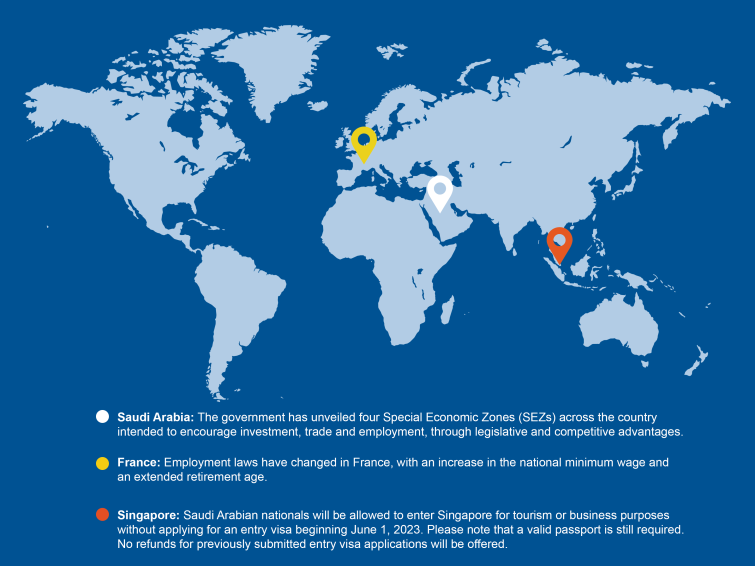CapRelo Insider: 24 May 2023

SUBSCRIBE TO THE INSIDER NEWSLETTER
Vacant Property Insurance on the Rise
In recent years, the U.S. insurance industry has been assailed by a host of natural disasters, from forest fires to floods, tropical storms to blizzards—all of which have driven up insurance premiums. With general costs rising substantially, these increases are most evident in the niche vacant property market.
Most relocation management companies insure vacant homes as part of their U.S. Homesale programs, but these policies face increasing costs and enhanced restrictions. Despite insurance rates rising from 10% – 200%, some areas are witnessing additional surcharges for flood, fire, or for proximity to the coast. Individual counties in some states (e.g., Massachusetts and New Jersey) face prohibitions from standard vacant home insurance programs. High-value homes are also being excluded from standard programs. With house prices continuing to rise nationally, alternatives have become harder to find.
Homes excluded from the standard program need to be insured for the vacant period between the relocating employee’s sale of the home to the relocation management company, and the subsequent resale to the outside buyer. While this period typically ranges from a few days to a few weeks, non-standard homes can cost hundreds of dollars per day to insure.
Impact: Rising costs are inevitable, and radically increased vacant property insurance costs need to be planned for, both in terms of relocation budgets and managing stakeholder expectations. Fortunately, the tax advantages to Homesale programs remain so significant that additional insurance costs remain negligible when compared to the overall savings.
EU’s New Sustainability Rules for Foreign Companies
As part of the European Union’s pledge for “climate neutrality by 2050”, foreign companies operating in the EU will be required to make carbon disclosures starting next year and the clock is ticking.
The new Corporate Sustainability Reporting Directive (CSRD) expands and replaces the previous Non-Financial Reporting Directive (NFRD), and was designed to address perceived NFRD shortcomings and loopholes. CSRD’s new reporting requirements will affect approximately 50,000 companies.
Under these requirements, companies will need to disclose sustainability information, which will be subjected to evaluation by a third-party auditor.
The rollout of applicability includes:
- January 1, 2024 – Large companies (500+ employees) already subject to NFRD, required to report in 2025
- January 1, 2025 – Large companies (250+ employees and/or €20 million in total assets/€40 million in turnover) not subject to NFRD, required to report in 2026
- January 1, 2026 – Small and Medium Enterprises required to report in 2027 (these companies can opt-out until 2028)
These changes support the European Commission’s 2050 climate pledge and their Biodiversity Strategy for 2030, in which the European Commission “commits to ensure that by 2050 all of the world’s ecosystems are restored, resilient, and adequately protected. This strategy aims to put Europe’s biodiversity on a path to recovery by 2030.”
Impact: U.S.-based companies with operations in the EU countries should begin assessing whether the new regulation applies and, if it does, begin planning to meet these requirements. It will take time to implement the tracking protocols to report sustainability data. As global mobility programs look for ways to contribute to their organizations’ sustainability goals, they should partner with RMCs to find ways that their supply chains and/or processes can support these goals.
New Changes for UK Shipping Considerations
This month has seen important developments with a potentially significant impact on relocation shipping times and assignee expectations for those shipping to or from the UK. As reported by the British Association of Removers, these developments include:
- Lithium-Ion Battery Dangers – As this type of battery has been linked to fires, they have been designated as “hazardous cargo”. This may even include the devices powered by Lithium-Ion batteries themselves, such as e-bikes, e-scooters, laptops, and power tools. For the moment, shipping lines will decide whether to allow these shipments on a case-by-case basis. Even if allowed, hazardous cargo is subject to heavy freight surcharges and special requirements that may cause shipping delays. Failing to declare Lithium-Ion batteries is a serious offence under maritime law—fines of this nature can total as high as $30,000 USD, in tandem with confiscation and/or disposal of the device.
- Driver Shortages – A major shortage of UK HGV drivers has driven up container haulage costs. This has also resulted in the cancellation of sea-container bookings with little notice.
- Ocean Rates – For UK export trade, costs for international sea-freight moves have fallen dramatically. This is owing primarily to reduced demand due to inflation and the war in Ukraine. At the same time, shipping-lines are adjusting for these lower freight rates, including deliberately slowing their ships to reduce fuel consumption; removing destination ports-of-call; and last-minute re-bookings from one ship to another due to capacity issues. This results in impacts to customer shipment arrivals and overall costs.
- Trade from Asia, Oceania, India, and the Middle East – Capacity and shipping times are currently robust. However, in the months to come, these same shipping-line measures may result in impacts to cost and increased shipment times.
- Trade from the U.S., Canada, the Caribbean, and Latin America – Presently capacity levels remain strong, and unloading times have improved at most U.S. ports. However, ports such as Portland, Seattle, and Vancouver are not presently being served on a direct ‘all water basis’, necessitating port deliveries to the East Coast which may then be subject to railway congestion. Additionally, bear in mind that peak summer months historically constrict availability.
- Trade from Europe and Africa – Generally, these shipping routes are considered reliable. “Hinterland destinations” requiring main ports and overland transport are being eliminated due to port congestion and or insufficient inland transport infrastructure.
Impact: As in years past, the summer season is busy and challenging throughout the world. We advise making plans as early as possible to ensure the best shipping options.
Canada Assisting Sudanese Nationals
With continued violence in Sudan, Canada has announced special measures to assist Sudanese nationals. Qualifying individuals may apply to extend their stay in Canada, or change their status as a visitor, student or temporary worker free of charge. Additionally, Canada is offering free open work permits to ease access to the labor market.
“Canada continues to call for an end to violence in Sudan and stands with the Sudanese people as they strive for peace,” said Sean Fraser, Minister of Immigration, Refugees and Citizenship. “Many Sudanese nationals currently in Canada can’t return home due to the dangerous and volatile situation in their home country. That’s why we’re taking steps to help them extend their stay here, so they can remain with their families, continue with their studies or find work in safety.”
Other measures that have been put into place include the Canada Border Services Agency issuing a temporary halt on removals to Sudan and IRCC deploying additional officers to Sudan to help with immigration-related operations.
For permanent resident visa applicants outside Canada, the country is also waiving approval requirements for passports or other travel documents for those wishing to go to Canada.
Impact: Given the volatile situation, Canadians in Sudan are being urged to go to travel.gc.ca for updates, and to contact Global Affairs Canada’s Emergency Watch and Response Centre for those wishing to leave Sudan.
COVID-19 “National Emergency” Ends, as Does Certain Tax Benefits
After three years, the United States formally ended the national emergency status of COVID-19 on May 11. While variants continue to circulate, the state of emergency’s legal conclusion will have several ramifications for the mobility industry.
Most pressingly, some expense categories previously deemed non-taxable will now become taxable for employees (per Internal Revenue Code Section 139), such as remote work expenses; childcare/tutoring; certain temporary housing costs; disinfectant supplies; telehealth costs; and specific expenses related to commuting, among other items. Insurance may not be required to cover rapid-testing and at-home testing without cost sharing.
Additionally, the COVID-19 mortgage forbearance program (under the Department of Housing and Urban Development) is also slated to conclude at the end of May.
Government rental assistance programs are also ending, as are moratoriums on evictions which may affect property availability and costs.
Given the fluid nature of the pandemic, vaccine supplies and access to medical treatments for COVID are expected to remain at high levels of availability for the near future. After May 11, laboratories were no longer required to report results, and national tracking of infections is expected to change, though details are unclear at this point.
Impact: It is highly recommended that companies consult with their tax providers, in-house tax teams, and relocation management companies to review compliance measures and ensure their employees are prepared for W-2 ramifications as the state of emergency comes to an official end.
Global Mobility Radar




